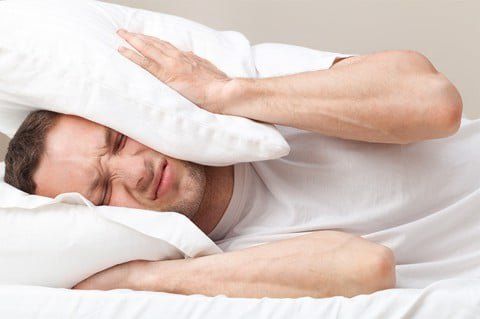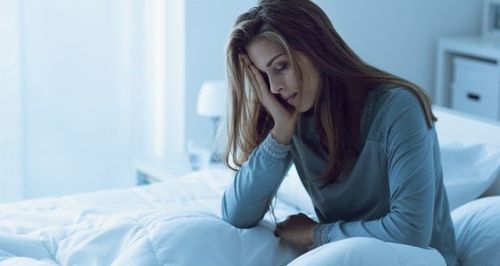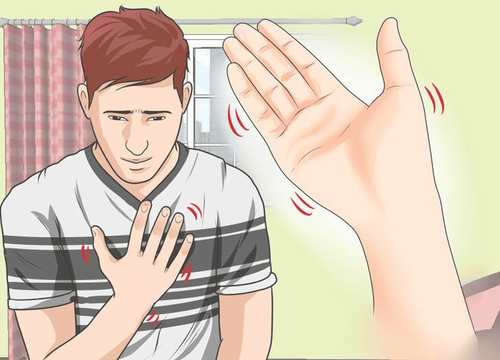This is an automatically translated article.
Many studies have come to the conclusion that poor sleep, or disrupted sleep, is not good for your mood. Sleep disruptions make you cranky about everything. That will be clarified through the article below.
1. Is interrupted sleep bad for your mood?
You probably already know how good sleep affects your mood. After a bad night's sleep or disrupted sleep, you may feel irritable, short-tempered, and prone to stress. Once you get a good night's sleep, your mood usually returns to being more pleasant.
1.1. Sleep disruption affects mood and vice versa
Studies have shown that even partial sleep deprivation or sleep disruption has a significant effect on mood. University of Pennsylvania researchers found that subjects who slept just 4.5 hours a night for a week reported feeling more stressed, angry, sad, and mentally exhausted. When the subjects resumed their normal sleep, they reported that their mood improved significantly.
Sleep not only affects mood, but mood and mental states can also affect sleep. Anxiety increases agitation and arousal, making it difficult to sleep. Stress also affects sleep by making the body euphoric, alert, and not alert. People who are under constant stress or have an abnormal stress response tend to have sleep problems such as poor sleep, or disrupted sleep.
1.2. Disruption of sleep due to repeated awakenings
A new study shows that waking up several times a night puts you in a worse mood than shorter periods of uninterrupted sleep. "When your sleep is disrupted throughout the night, you don't have a chance to progress through the sleep stages to get the good night's sleep, the key to a sense of recovery," says Professor Patrick Filan of Psychiatry. and behavioral sciences at the Johns Hopkins University School of Medicine in Baltimore.
The study included 62 healthy men and women whose moods were assessed for three consecutive days. Each night, study participants had a normal bedtime with compulsive wakes or a later bedtime with uninterrupted sleep. The two groups had similar low levels of positive mood and negative mood levels high after the first night, but the significant difference became apparent after the second night, the investigators found.
Compared with the first day, those in the forced-wake group had a 31% decrease in positive mood on the second day, compared with a 12% decrease in those in the later bedtime group. The results showed no significant difference in negative mood between the two groups on any of the three days, which suggests that sleep disturbances are particularly harmful to positive moods.
According to the study published in the November 1 issue of the journal Sleep, the study included people with normal sleep habits, but it's likely the findings also apply to people with insomnia, the researchers said. rescue said. Waking up several times during the night is one of the most common symptoms of insomnia, affecting about 10% of American adults.

Gián đoạn giấc ngủ có ảnh hưởng đáng kể đến tâm trạng
1.3. Does mood affect insomnia?
Professor Patrick Finan said in a university statement: “Many people with insomnia are able to fall asleep and begin to wake up throughout the night, when they are unable to return to normal sleep. He also notes: Poor mood is a common symptom of insomnia. He suggests that additional research is needed to learn more about sleep stages in people with insomnia and the role mood plays in a normal night's sleep.
1.4. Sleep has a big relationship with psychological problems
Dr. Lawrence Epstein, Medical Director of the Center for Sleep Health and a faculty member at Harvard, says: “There is a strong relationship between mental, psychological, and sleep problems.
Difficulty sleeping or not getting a good night's sleep is sometimes the first symptom of depression. Studies have found that 15 to 20% of people diagnosed with insomnia will experience major depression. While sleep research is still exploring the relationship between depression and sleep, studies have shown that people with depression can have unusual sleep patterns.
Sleep problems can contribute to psychological problems. For example, chronic insomnia can increase a person's risk of developing a mood disorder, such as depression or anxiety. In a large study of 10,000 adults, those with insomnia were five times more likely to develop depression.
Sleep deprivation may be an even greater risk factor for anxiety. In the same study, people with insomnia were 20 times more likely to develop panic disorder (a form of anxiety disorder). Another study found that insomnia is a reliable predictor of depression and many other mental disorders, including all types of anxiety disorders.

Gián đoạn giấc ngủ khiến tâm cáu gắt nhiều hơn là thiếu ngủ
2. Sleep disruption makes the mind more irritable than lack of sleep
After a bad night's sleep, you're unlikely to be in your best mood. But according to a new study, your bad mood may be due to lack of quality sleep rather than lack of quantity. Published in the journal Sleep, the study found that people whose sleep was regularly disrupted for three consecutive nights reported significantly worse mood than those who slept less due to going to bed later.
Study lead author Professor Patrick Finan, assistant professor of psychiatry and behavioral sciences at Johns Hopkins University School of Medicine in Baltimore, MD, and colleagues say their findings suggest disruption Sleep is more harmful to mood than lack of sleep, which may shed light on the link between depression and insomnia.
According to the National Sleep Foundation, adults aged 18-64 should aim to get about 7-9 hours of sleep per night, while those 65 and older should sleep about 7-8 hours per night. This study also shows that getting enough sleep can help boost the immune system, productivity and mood.
But more and more studies show that sleep quality is just as important as sleep duration. "Disrupted sleep led to a 31 per cent decrease in positive mood," noted Professor Finan. In addition, Professor Finan and colleagues demonstrated the effect of disrupted sleep on mood in their study of 62 healthy men and women, for 3 consecutive nights in a set of studies. clinical study, randomly assigned to one of three sleep states.
One group had uninterrupted sleep each night, one group was late for bedtime, while the other group was intentionally awakened 8 times during sleep each night. Each subject's sleep stages are monitored using a sleep polygraph, which records brain waves, blood oxygen levels, breathing rate, heart rate, and eye and leg movements while you sleep.
At the end of each night, participants were asked to report how much they felt positive or negative emotions, such as anger or joy, which the researchers assessed to determine their moods. surname.
While there was no difference in mood between the groups after the first night, and participants in the interrupted sleep group experienced a 31% decrease in positive mood after the second night, while those in the late sleep group 12% decrease in positive mood. These declines continued after Tuesday night.
The team said there was no significant difference in negative mood between the late sleep group and the interrupted sleep group on any day of the 3 days, suggesting that disrupted sleep had a more negative impact to a positive mood.
Even if you don't have underlying problems with poor sleep, or disrupted sleep, taking steps to ensure adequate sleep will help improve your mood and physical and mental health. friend.
Periodic health checkup is one of the earliest ways to recognize and prevent disease. Currently, Vinmec International General Hospital has general health checkup packages suitable for each age, gender and individual needs of customers with a reasonable price policy, including:
Health checkup package overview Vip 2021 Comprehensive health checkup package 2021 Premium health checkup package 2021 Patient's examination results will be returned to your home. After receiving the results of the general health examination, if you detect diseases that require intensive examination and treatment, you can use services from other specialties at the Hospital with quality treatment and services. outstanding customer service.
Please dial HOTLINE for more information or register for an appointment HERE. Download MyVinmec app to make appointments faster and to manage your bookings easily.
Source: medicalnewstoday.com, webmd.com












